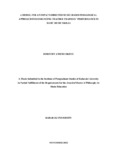A MODEL FOR AN IMPACT-DIRECTED MUSIC-BASED PEDAGOGICAL APPROACH FOR ENHANCING TEACHER TRAINEES ' PERFORMANCE IN BASIC MUSIC SKILLS
Abstract
Music education is a field of study associated with the teaching and learning of music.
Music teachers should apply appropriate pedagogical approaches that best suit specific
level outcomes. Over the years, practitioners and educationists have noted a decline in
teacher trainees‟ performance in music at primary teacher education (PTE) level. There
is little indication on whether the use of music-based pedagogical approaches impact on
the teacher trainees‟ performance in PTE music examination in teacher training colleges.
The current study was prompted by the need for pedagogical approaches that would help
in raising efficiency in teaching music and by extension yielding better results. The
purpose of this study therefore was to develop a model for an impact-directed music based pedagogical approach for enhancing teacher trainees‟ performance in basic music
skills. The objectives of the study include: to determine the impact of the use of Kodály
pedagogical approach (KPA) on teacher trainees‟ performance in music basic skills, to
establish the impact of the use of Orff pedagogical approach (OPA) on teacher trainees‟
performance in basic music skills, to analyse the impact of the use of Dalcroze
pedagogical approach (DPA) on teacher trainees‟ performance in basic music skills and
to propose a model for an impact-directed music-based pedagogical approach. The study
was guided by Music Learning Theory by Gordon and complemented by the theory of
Multiple Intelligences by Gardner. The study adopted mixed methods quasi-experimental
research design. Selected experimental group was exposed to the music-based
pedagogical approaches while control group continued with the traditional teaching
approaches used by music tutors. The target population was 344 comprising of 341
teacher trainees in second-year and 3 college music tutors. Purposive sampling was used
to draw participating tutors teaching music while census sampling was used to select
teacher trainees studying music in second-year. A sample of 3 tutors teaching music and
170 teacher trainees studying music in second-year participated in the study.
Questionnaires, an interview schedule, pre-test and post-test evaluation were used in
collection of data for the study. A pilot study was conducted to determine the reliability
of the research instruments. Cronbach‟s alpha was used to estimate the reliability of the
instruments. A correlation co-efficient value of 0.748 was achieved. The research
instruments were validated by the help of the supervisors and experts from the School of
Education and School of Music and Media. Frequencies, percentages and means were
used to summarize and describe data whereas Analysis of Variance (ANOVA) and T-test
were used to establish the impact. All hypotheses were tested at α = 0.05 level of
significance. The study revealed that there was statistically significant difference in the
use of KPA on teacher trainees‟ performance in basic music skills. The study also
revealed that sequential instruction has great potential for improvement of music basic
skills (rhythm, melody, intervals, triads, transposition, and translation) at PTE music
examination. Further, the study has proposed a model for an impact-directed music based pedagogical approach, which it is hoped when adapted will improve the overall
performance of PTE music curriculum in Kenya, particularly equipping the teacher
trainees with musicianship skills while also helping the music tutors develop content
knowledge, practical experiences and effective pedagogical approaches. To this end, the
study recommends that Kenya Institute of Curriculum Development (KICD) should
consider inclusion of the principles of all music-based pedagogical approaches in the
current curriculum reform

